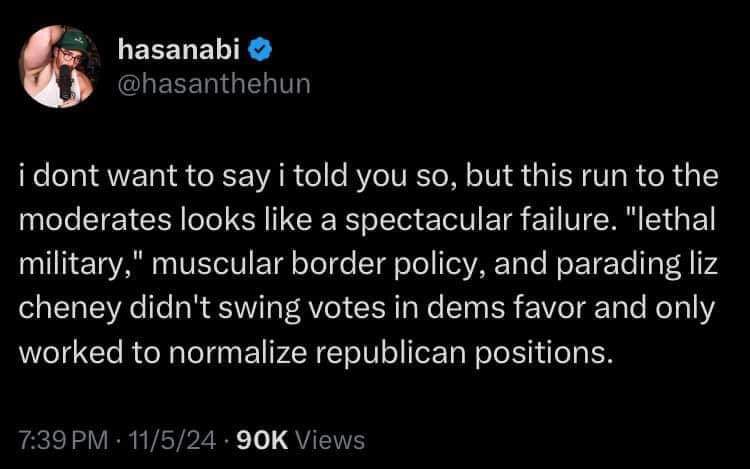823
you are viewing a single comment's thread
view the rest of the comments
view the rest of the comments
this post was submitted on 06 Nov 2024
823 points (91.4% liked)
Microblog Memes
11022 readers
238 users here now
A place to share screenshots of Microblog posts, whether from Mastodon, tumblr, ~~Twitter~~ X, KBin, Threads or elsewhere.
Created as an evolution of White People Twitter and other tweet-capture subreddits.
RULES:
- Your post must be a screen capture of a microblog-type post that includes the UI of the site it came from, preferably also including the avatar and username of the original poster. Including relevant comments made to the original post is encouraged.
- Your post, included comments, or your title/comment should include some kind of commentary or remark on the subject of the screen capture. Your title must include at least one word relevant to your post.
- You are encouraged to provide a link back to the source of your screen capture in the body of your post.
- Current politics and news are allowed, but discouraged. There MUST be some kind of human commentary/reaction included (either by the original poster or you). Just news articles or headlines will be deleted.
- Doctored posts/images and AI are allowed, but discouraged. You MUST indicate this in your post (even if you didn't originally know). If an image is found to be fabricated or edited in any way and it is not properly labeled, it will be deleted.
- Absolutely no NSFL content.
- Be nice. Don't take anything personally. Take political debates to the appropriate communities. Take personal disagreements & arguments to private messages.
- No advertising, brand promotion, or guerrilla marketing.
RELATED COMMUNITIES:
founded 2 years ago
MODERATORS

"they lived under better circumstances in the last Trump term"
They lived under fucking Covid in the last Trump term, when everyone was confined to their homes while supply lines disintegrated and the cost of food more than doubled, while ashes from rampant forest fires rained down from a blood red sky.
That was only the end of it though. Through most of it, many aspects of the economy were better, for most people. He was just as complicit in why inflation, housing costs, etc. got so bad. However, do you think most people understand how the free money given, mostly under Biden, as a stimulus to the populace, had little effect on the inflation vs financial institutions drowning in oceans of free money, for 20 years? Do you think most people are even aware that was going on? Do you think most of them understand how private equity, and changes in its regulation, caused the housing cost crisis, and not supply being overwhelmed by the demand of immigrants?
I talked to someone I used to do underwriting, for things like mortgages, a few months back. He bought the immigrants buying up all the housing line. He just refused to believe private equity, something he definitely understands, is responsible, regardless of the fact that even those private equity institutions' data say they are at fault. It is much easier to say "housing unaffordable, close border" than to have to address the massive systemic changes that need to be made.